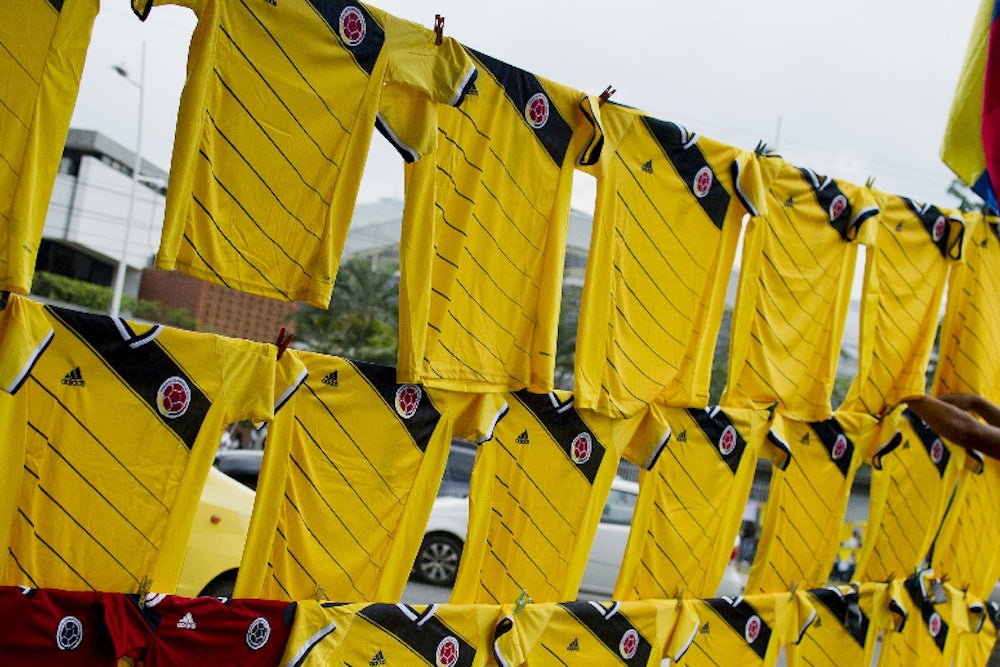Even before I made radio I had a soft spot for the form, and in particular for soccer on the radio. This is a family inheritance: my father used to call games on Radio Continental back in Arequipa, Peru in the 1950s. So, when we were stuck in typically horrifying traffic on the way out of Bogota for the weekend, I made the best of it, and did something I don’t often get to do: tune in the game. In this case, the match was France versus Switzerland on Caracol Radio, one of Colombia’s largest national radio networks.
The game—well, you know what happened. Switzerland were handed a 5-2 drubbing. Arsenal striker Olivier Giroud stated his case for starting alongside Karim Benzema, who was lethal once again, except from the penalty spot. Yohan Cabaye missed a sitter, the Swiss had a goal called back, Djourou was awful, Senderos was worse, and like nearly every match in this nutty World Cup, there were goals and more goals. To the point of cruelty, according to the announcers—who were fantastic by the way, treating the Spanish language like the French treated the Swiss, with bravado that bordered on mockery. At least three new words were invented in the first half. Blood was described as “protuberant.” Goal scoring opportunities lacked “concretion.” Valbuena—what a player!—sounded tall. The traffic barely budged as we headed south, but the time passed anyway. It was great.
But at a certain point (after the fourth French goal, I think) it wasn’t the game that I found so riveting; it was the advertisements. One, in particular, was played every two or three minutes: an ad for demobilization. Let me explain: this match, with its slapstick defending and blazing counterattacks, was periodically interrupted for an ad inviting guerillas to turn in their weapons and rejoin Colombian society. “Your family is waiting for you at home,” a male voice said. “You can watch the game in liberty.”
It’s easy in Bogota, with its malls and money and housing boom, to forget that Colombia is at war. Street violence; yeah, sure, there’s plenty of that. The sale of alcohol was prohibited in Bogotá for Colombia’s second match, after police responded to more than 3,000 separate incidents in the hours after the opening victory over Greece. There were nine deaths—but that’s the story everywhere in Latin America, and if it’s dispiriting, it could hardly be less surprising. War, however, is another matter. On Thursday, after the national team beat a strong Cote D’Ivoire side to move on to the Round of 16, there was certainly no hint of war in the streets of the capital. Unity was the general feeling: flags flapping from motorcycles, thousands of men, women and children clad in bright yellow jerseys, the occasional teenager tossing flour and foam in the air, horns honking, and a real sense of disbelief, even awe at what had been accomplished. Colombians love this fucking team. All afternoon, after the match, friends were confessing how they’d cried when Quintero’s goal went in. I believe them, of course: I’m not even Colombian, and I had too.
But then you listen to a random game on Caracol radio, and hear again and again an ad telling you to “Demobilize!” and you realize that there is a war happening. Somewhere. You knew—of course, you did—but you let yourself forget. Other people haven’t. Someone has decided to invest in this campaign—after all, guerrillas and paramilitaries are just like you and me. They love fútbol too. They stop for the World Cup, just like the rest of the planet.
Does it work?
This guerrilla, the fighter, this young conscript in one of the country’s irregular armies—does this ad speak to him? Is he listening to this match on Caracol, off in the jungle somewhere, and wondering if there’s another life for him? It seems so farfetched—and it is—but then again, if you lived in a country where a war had gone on for fifty years, wouldn’t you try everything to make it stop?
